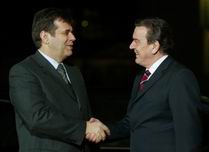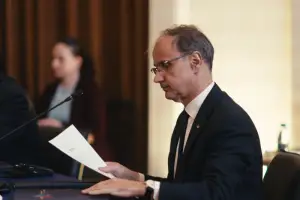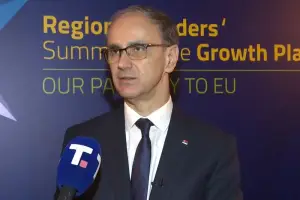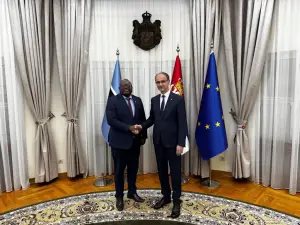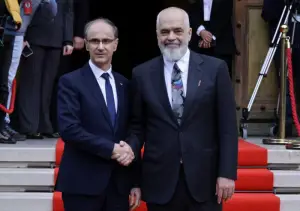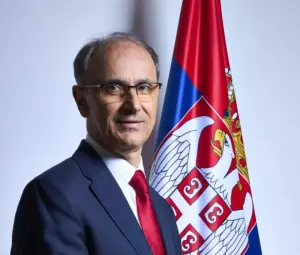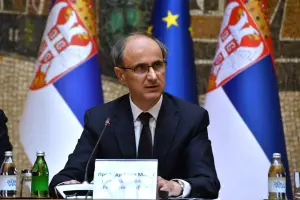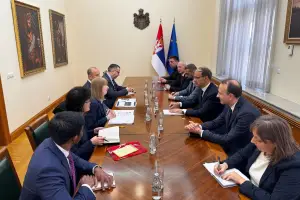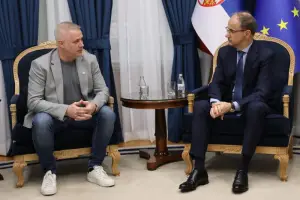Q:
A:
Improvement of economic cooperation facilitates development of political relations between Serbia-Montenegro and Germany
Belgrade/Berlin,
18 November 2004
Serbian Prime Minister Vojislav Kostunica and German Chancellor Gerhard Schroeder, meeting in Berlin today, pointed to the great significance of the good relations that exist between the two countries, adding that an improvement of economic cooperation will facilitate the development of political relations as well.
Following the meeting with Schroeder, Kostunica told reporters that the German chancellor once again expressed his support to the preservation of the state union of Serbia and Montenegro and to our country’s European orientation.
As for Kosovo-Metohija, the Serbian prime minister has informed Schroeder about the circumstances in the province, the functioning of the provisional institutions and the situation in the wake of elections held on October 23.
The two officials also agreed on the need for a dialogue on decentralisation of power in Kosovo-Metohija and that these talks must involve all relevant participants – Kosovo Serbs and ethnic-Albanians, the UN Mission, and representatives of Belgrade.
Kostunica also told Schroeder that when it comes to cooperation with The Hague tribunal, there is awareness in the Serbian government that the movement of Serbia towards Euro-Atlantic integration is being slowed down or, in some cases, even blocked.
He enlisted all the reliable checks that have been carried out in connection to some Hague indictees and he reiterated that whatever has not been achieved by now, when it comes to cooperation, will be done “in the time ahead”.
During the meeting, Kostunica and Schroeder also discussed economic cooperation, taking into account Serbian citizens in Germany and the fact that Serbia and Germany are two countries that have had good economic cooperation for decades.
Serbian Prime Minister Vojislav Kostunica warned today that a representative of the Serbian government must be included in further talks on decentralisation of power in Kosovo-Metohija.
Any exclusion of Belgrade from those talks or attempts to reduce its significance to an expert or advisory role, would be contrary to Resolution 1244, it would be discrimination and would lead to a failure of the talks, said Kostunica following numerous meetings with reputable political and business leaders gathered at the fourth economic conference of South Eastern Europe.
The Serbian prime minister said that everyone could see first hand that the basic ideas in the Serbian government’s plan for decentralisation of Kosovo-Metohija are good, reiterating Serbia’s commitment to dialogue and its readiness to seek solutions together with the UN Mission in Kosovo-Metohija (UNMIK). Kostunica noted that Serbia is waiting for UNMIK to step up its dialogue with the Albanian side, because, as he pointed out, that is where the obstacles lie.
Asked whether the talks touched on the status of the province, the prime minister said that he is convinced that such talks would be premature at this moment, given that no standards have been implemented yet. He expressed conviction that in the atmosphere of a deficit in the protection of human rights, it is not the right time to open the issue of the status of Kosovo-Metohija and that talks on decentralisation should not be launched just to prove that the situation in Kosovo is looking up.
Any solution that would contribute to further disintegration of the Balkans would not contribute to stability, the Serbian prime minister stressed.
He confirmed that the talks in Berlin also touched on the cooperation of Belgrade with The Hague. Kostunica informed the officials that he addressed everything that has been done in the field so far, stressing the people who are already in The Hague, the decisions to relieve witnesses of the obligation to keep state secrets, and allowing access to archives and documents.
The Serbian prime minister said that nothing can put in question Belgrade’s willingness and awareness of the necessity to cooperate with the tribunal, with, as he said, respect to the stability of the country.
Asked whether the government is prepared to make concessions in order to take further steps towards Europe, he recalled that many concessions have already been made. He called on as examples the patience the government uses in interactions with Montenegro, and how it handled the untruths about the status of the Hungarian minority in Vojvodina.
The Serbian prime minister also spoke today with the political director of the German Ministry of Foreign Affairs, Michael Scheffer, and deputies from the Bundestag’s committee on foreign affairs, as well as with Bodo Hombach, former Coordinator of the Stability Pact for South Eastern Europe, about issues concerning the state union, and especially about the improvement of economic cooperation between the two countries.
As for Kosovo-Metohija, the Serbian prime minister has informed Schroeder about the circumstances in the province, the functioning of the provisional institutions and the situation in the wake of elections held on October 23.
The two officials also agreed on the need for a dialogue on decentralisation of power in Kosovo-Metohija and that these talks must involve all relevant participants – Kosovo Serbs and ethnic-Albanians, the UN Mission, and representatives of Belgrade.
Kostunica also told Schroeder that when it comes to cooperation with The Hague tribunal, there is awareness in the Serbian government that the movement of Serbia towards Euro-Atlantic integration is being slowed down or, in some cases, even blocked.
He enlisted all the reliable checks that have been carried out in connection to some Hague indictees and he reiterated that whatever has not been achieved by now, when it comes to cooperation, will be done “in the time ahead”.
During the meeting, Kostunica and Schroeder also discussed economic cooperation, taking into account Serbian citizens in Germany and the fact that Serbia and Germany are two countries that have had good economic cooperation for decades.
Serbian Prime Minister Vojislav Kostunica warned today that a representative of the Serbian government must be included in further talks on decentralisation of power in Kosovo-Metohija.
Any exclusion of Belgrade from those talks or attempts to reduce its significance to an expert or advisory role, would be contrary to Resolution 1244, it would be discrimination and would lead to a failure of the talks, said Kostunica following numerous meetings with reputable political and business leaders gathered at the fourth economic conference of South Eastern Europe.
The Serbian prime minister said that everyone could see first hand that the basic ideas in the Serbian government’s plan for decentralisation of Kosovo-Metohija are good, reiterating Serbia’s commitment to dialogue and its readiness to seek solutions together with the UN Mission in Kosovo-Metohija (UNMIK). Kostunica noted that Serbia is waiting for UNMIK to step up its dialogue with the Albanian side, because, as he pointed out, that is where the obstacles lie.
Asked whether the talks touched on the status of the province, the prime minister said that he is convinced that such talks would be premature at this moment, given that no standards have been implemented yet. He expressed conviction that in the atmosphere of a deficit in the protection of human rights, it is not the right time to open the issue of the status of Kosovo-Metohija and that talks on decentralisation should not be launched just to prove that the situation in Kosovo is looking up.
Any solution that would contribute to further disintegration of the Balkans would not contribute to stability, the Serbian prime minister stressed.
He confirmed that the talks in Berlin also touched on the cooperation of Belgrade with The Hague. Kostunica informed the officials that he addressed everything that has been done in the field so far, stressing the people who are already in The Hague, the decisions to relieve witnesses of the obligation to keep state secrets, and allowing access to archives and documents.
The Serbian prime minister said that nothing can put in question Belgrade’s willingness and awareness of the necessity to cooperate with the tribunal, with, as he said, respect to the stability of the country.
Asked whether the government is prepared to make concessions in order to take further steps towards Europe, he recalled that many concessions have already been made. He called on as examples the patience the government uses in interactions with Montenegro, and how it handled the untruths about the status of the Hungarian minority in Vojvodina.
The Serbian prime minister also spoke today with the political director of the German Ministry of Foreign Affairs, Michael Scheffer, and deputies from the Bundestag’s committee on foreign affairs, as well as with Bodo Hombach, former Coordinator of the Stability Pact for South Eastern Europe, about issues concerning the state union, and especially about the improvement of economic cooperation between the two countries.

